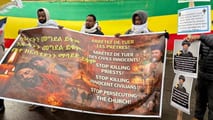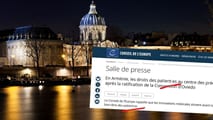Churches – EU Commission Dialogue Seminar on Freedom of Religion
On 30 March, the European Centre for Law and Justice (ECLJ) participated at the European Commission to the Dialogue-Seminar on “Freedom of Religion: A Fundamental Right in a Rapidly Changing World”. This Dialogue Seminars is co-organised by the Commission of the Bishops' Conferences of the European Community (COMECE) and the Church & Society Commission of the Conference of European Churches (CEC) together with the Bureau of European Policy Advisors of the European Commission (BEPA).
Dialogue Seminars have a longstanding tradition in the cooperation between the European Commission and the Churches in Europe. Since their beginning in the early 1990s, they have proved to be a significant discussion forum for matters of common concern. It allows for an open exchange of views on pertinent EU policies. They represent an important element of the open, transparent and regular dialogue between the Churches in Europe and the European Commission. Dialogue Seminars usually take place twice a year. The Lisbon Treaty (Article 17 TFEU[1]) has lifted the dialogue from good practice to a legal obligation, enshrined in primary law.
This full-day Seminar dedicated to on Freedom of Religion was subdivided into three sections: Session 1: Freedom of Religion in the context established by the Treaty of Lisbon; Session 2: Current Challenges for Freedom of Religion in the EU; and Session 3: Religious Minorities outside the EU: The struggle to safeguard Common Rights and Common Citizenship. This seminar has been very open, constructive and sincere; it was co-chaired by Mgr Prof. Dr Piotr Mazurkiewicz, General Secretary of COMECE, Mr Jean-Claude Thébault, Director General, Bureau of European Policy Advisers (BEPA) and Rev. Rüdiger Noll, Director of the Church & Society Commission and Associate General Secretary of CEC. (See here the Program and the List of participants )
The dialogue focused on the action of the Commission in support of Freedom of Religion both inside and outside Europe, pursuant to the Treaty of Lisbon.
- Concerning religious freedom outside Europe, an interesting dialogue took place in particular with a delegation from Pakistan lead by H.E. Mgr Joseph Coutts, Archbishop of Karachi and Dr Paul Bhatti, Minister of National Harmony, and brother of Mr Shahbaz Bhatti, former Minister assassinated in March 2011. Mr Charles-Michel Geurts, (Deputy Head of Division Human Rights Policy Instruments and Bilateral Cooperation EEAS) exposed the growing attention of the European External Action Service to religious freedom within its bilateral and multilateral action. The increasing commitment of the European External Action Service is satisfactory and encouraging for the protection of the religious minorities abroad. Mr Geurts explained, inter alia, that this commitment is largely a result of the demands from the civil society, some governments and the resolutions in support of the Christians in Middle East adopted by the European Parliament on January 20th and by the Parliamentary Assemble of the Council of Europe on January 27 2011.
- Concerning religious freedom inside Europe, Professor Giorgio Feliciani, from the Catholic University of Milan, gave a deep presentation on the current challenges facing the juridical and philosophical concept of religious freedom. In particular, he insisted on the challenge for religious freedom to address the social dimension of religion in a correct manner, and to avoid becoming an instrument misused in order to undermine the social legitimacy of religion. He also recalled the fundamental importance of the institutional dimension of religious freedom. This institutional dimension, recognized both in European and International law under the “principle of autonomy”, is the legal concept guaranteeing the distinction between religions and civil authorities, and therefore protecting both the religious communities and the civil authorities against abuses.
Dr Gudrun Kugler, Director of the “Observatory on Intolerance and Discrimination against Christians” presented the outcome of the 2011 Observatory's Report which portrays the tendencies, developments and cases of intolerance and discrimination throughout Europe. She reported in particular that grave episodes of intolerance and discrimination against Christians do occur in Europe and should not be neglected by institutions as it is the case at the moment. She also reported professional restrictions affecting Christians through a restrictive application of freedom of conscience in various professions such as magistrates, doctors, nurses and midwives as well as pharmacists slowly closing for Christians. She also underlined that teachers and parents get into trouble when they disagree with state-defined sexual ethics. Some participants recalled that the European Commission has produced over three million copies of an agenda for the year 2011 containing reference to many religious feasts but not the Christian ones.
Mr Aurel Ciobanu-Dordea, Director Equality at DG Justice, and Mr Ioannis Dimitrakopoulos, Head of Unit Equality and Citizen's Rights at the EU Fundamental Rights Agency, exposed the actions undertaken by the Commission. Mr Dimitrakopoulos announced that a report on Religious Freedom in Europe is under preparation by the FRA network of experts.
Dr Grégor Puppinck, Director of the ECLJ, exposed that while he appreciates the growing involvement of the EU External Action Service for religious freedom, he is still quite skeptical regarding the approach on religious freedom adopted inside Europe by the EU Fundamental Rights Agency and the EU Commission’s Unit on Equality and Citizen's Rights. Dr Puppinck underlined that equality and non-discrimination do not exhaust religious freedom: religious freedom is different and much broader. While religious freedom is a universal human right based on the universality of the human nature, the concepts of equality and non-discrimination presuppose and lead to a more communitarian and relativistic approach of religions: they do not acknowledge and are not able to address the consequence of the transcendence of the human being. Considering Human Rights mainly under the limited scope of equality and non-discrimination creates the risk that the value of equality prevails over those of freedom and justice, whereas human rights are based on freedom and justice and cannot be reduced to equality. This shift of philosophical paradigm explains why Europe is now confronted with an increasing number of conflicts between the logic of equality/non-discrimination and the right to freedom of conscience and religion. This is particularly the case regarding moral issues, as enshrined by the discussion regarding conscientious objection. The very deep reason for this shift is the difficulty of the modern democratic societies to understand that justice is different, and much more constructive, than equality. In fact, recent experience shows that equality, as a tool for social fabric, creates more problems than it is able to solve; this is of particular concern regarding the Draft Directive on Equal Treatment which would, if adopted, ultimately enhance the governmental control of social behavior of citizens.
Concerning the draft directive on data-protection, while recognizing the great importance of protecting personal data in the modern world, the ECLJ considers necessary to include an explicit reference to religious freedom in order to ensure due respect for the right and freedom of the churches to hold their registers. For the ECLJ, it is clear that because those registers contain records of the sacraments received by individuals (baptism, confirmation, marriage, priesthood), they concern directly a central aspect of the religious practice; therefore, those registers are by nature, and shall stay, out of the control of the civil governments, especially because they are used exclusively for religious purposes.
The ECLJ was pleased to participate to this pleasant and constructive Dialogue-Seminar and wishes to continue to offer its expertise to the European Commission in support of Freedom of Religion both inside and outside Europe.
* * *
The European Centre for Law and Justice is an international, Non-Governmental Organization dedicated to the promotion and protection of human rights in Europe and worldwide. The ECLJ holds special Consultative Status before the United Nations/ECOSOC since 2007. The ECLJ engages legal, legislative, and cultural issues by implementing an effective strategy of advocacy, education, and litigation. The ECLJ advocates in particular the protection of religious freedoms and the dignity of the person and life with the European Court of Human Rights and the other mechanisms afforded by the United Nations, the Council of Europe, the European Parliament, the Organization for Security and Cooperation in Europe (OSCE), and others. The ECLJ bases its action on “the spiritual and moral values which are the common heritage of European peoples and the true source of individual freedom, political liberty and the rule of law, principles which form the basis of all genuine democracy” (Preamble of the Statute of the Council of Europe).
[1]The Treaty of Lisbon explicitly introduces the requirement of a dialogue between European institutions and churches.
Article 17 TFEU reads as follow:.
1. "The Union respects and does not prejudice the status under national law of churches and religious associations or communities in the Member States.
2. The Union equally respects the status under national law of philosophical and non-confessional organisations.
3. Recognising their identity and their specific contribution, the Union shall maintain an open, transparent and regular dialogue with these churches and organisations."









